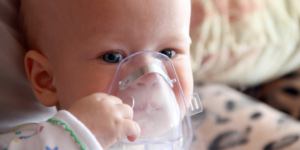One thing parents of preemies and NICU babies hear often from well-meaning friends, family and even strangers is, “Don’t be so overprotective about germs! It’s good for their immune system!”
Unfortunately this manner of thinking is dangerous and can put your baby at risk. Those who have not had a NICU experience often do not understand the repercussions of exposing a baby with a weak immune system to germs.
A preemie’s immune system
A baby’s immune system, no matter what gestation, is not as strong as an adult’s. Over time, as the immune system is exposed to different viruses and bacteria, it will start to develop antibodies to respond to infections or develop an immunity to a certain virus (i.e. chickenpox). Babies born at term usually receive additional antibodies through the placenta during the third trimester, giving them some immunity to diseases that they have not yet been exposed to. Babies eventually produce their own antibodies when they are exposed to germs or viruses; however, it takes time for this immunity to fully develop.
Premature babies, however, miss some or all of the third trimester. They receive fewer or none of these antibodies, making them more susceptible to infection outside the womb. In addition, a preemie’s immune system may have trouble efficiently producing necessary cells and antibodies.
The myth of “it’s good for their immune system”
The saying “It’s good for their immune system” can be a dangerous line of thinking when it comes to infants, especially preemies and those with compromised immune systems. Catching a dangerous virus such as RSV doesn’t strengthen their immune system. It can lead to hospitalization, life-long health complications and even death.
If you are a NICU parent, your medical team likely gave you explicit instructions on how to keep your baby safe from germs, especially during RSV season. This may include limiting exposure to a small number of exclusive caregivers (parents, grandparents, nanny, etc.) and preventing exposure to outside friends and family until your baby is a little older. Many families end up going into isolation during these periods and avoid leaving their home for anything but medical appointments.
How to navigate friend and family requests
This obviously can cause friction with well-meaning friends and family members who want to visit your baby or have you join them for a get together. NICU parents often fear offending loved ones, alienating friends or even being labeled as over-protective. Family members may pressure you to allow them to visit. But your baby’s health is the most important thing to consider.
Read next: Coming Home During Flu and RSV Season
Preemie triplet mom and Hand to Hold Family Support Specialist Cristal suggests NICU parents simply explain to their friends and family that it just isn’t a good time yet, because your child is still medically fragile. She advises parents to trust their gut and do what is best for their baby. “I remind parents that when their baby comes home, it is not an opportunity for “show and tell,” but an opportunity to catch up on bonding time with their baby.”
Follow the guidelines given by your NICU team upon discharge and your pediatrician to ensure your baby’s safety. Share these guidelines with anyone who questions your decision to restrict visitors and limit your baby’s contact with the outside world.
Although there are no guarantees, consider giving friends and family an estimate as to when they’ll be able to meet your new addition, preferably after cold, flu and RSV season has ended. it may be months out on the calendar, but those months are necessary for your baby to stay healthy.

